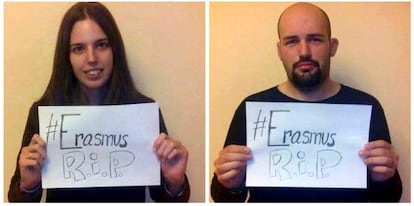"They didn't commit to keeping next year's grants," say Erasmus defenders
Students across Europe hail decision to reverse cutbacks, but warn that fight is not over

On Sunday afternoon, four Spanish students in the Italian city of Foggia opened Facebook Erasmus Grants 2013-2014. This is the tool that has quickly mobilized students scattered across Europe, from Lapland to Istanbul, against the Spanish government's sudden decision to slash its contribution to their Erasmus study grants partway through the academic year.
Just 48 hours later, inside the same house, 15 Spaniards cried for joy and hugged one another as the media reported that Education Minister José Ignacio Wert was backtracking on his decision, and restoring the grants. The government awards each exchange student up to 180 euros a month to help cover the expenses of living abroad for up to a year.
Meanwhile, another Spanish student, Laura Zornoza, 20, was waging her own private war against the government's cuts. A journalism student at Rey Juan Carlos University in Madrid who plans on studying in Hamburg next year on the Erasmus program, she started a petition at Change.org that soon attracted over 200,000 signatures.
On Wednesday, Zornoza took the signatures to the Education Ministry, where unusually, a high-ranking official was waiting to meet with her. But Federico Morán, secretary general for universities, "did not make a commitment to preserve the grants next year," she warned.
Many of the Foggia students only had enough funds to hold out until March
But for now at least, exchange students will not have to come home early. Many of the Foggia students only had enough funds to hold out until March. In order to save money, they were eating the food that their families sent them regularly in care packages. Fortunately Foggia is in southern Italy, so heating was not necessary.
Their campaign involved two days of intense work and frustration - especially when the minister asked Erasmus recipients for "sacrifices" - but it was also a time of giddiness and hope fed by all the shows of support that soon began pouring in.
"We slept six hours in two days. For 35 straight hours there were people online. It was worth it. We can't believe it," said one of the students in a Skype conversation with EL PAÍS.
Just a few hours earlier, the group confessed to this newspaper that they didn't want to tell their families about their initiative, and wondered whether anything would really change. The core of the activist group is made up of Alex Peñuela (a law student from Jaén), Germán Fernández (a medical student from Seville), Fernando Orozco (a marketing student from Almería) and Iñaki Talens (a physical education student from Valencia).
As soon as the online campaign against the elimination of the study grants began, emails and protest videos began coming in from other Spanish Erasmus students. Many of the videos showed the activists holding flags with a message: "Erasmus is Europe." Meanwhile, Turkish, French and Greek nationals began sympathizing with their cause and contributed their own videos.
"People got as upset as ourselves over this, and that was the key," the group members explain. "Without this collaborative effort, none of the things we did would have been of any use."
Within the first 12 hours, their Facebook page had 4,000 followers. By the time the minister went back on his decision, there were over 9,000. By then they had also created a website and posted a long series of videos on YouTube.
The fight is not over. But for now, they are celebrating their first victory with the Twitter hashtag #erasmuswin.
Tu suscripción se está usando en otro dispositivo
¿Quieres añadir otro usuario a tu suscripción?
Si continúas leyendo en este dispositivo, no se podrá leer en el otro.
FlechaTu suscripción se está usando en otro dispositivo y solo puedes acceder a EL PAÍS desde un dispositivo a la vez.
Si quieres compartir tu cuenta, cambia tu suscripción a la modalidad Premium, así podrás añadir otro usuario. Cada uno accederá con su propia cuenta de email, lo que os permitirá personalizar vuestra experiencia en EL PAÍS.
¿Tienes una suscripción de empresa? Accede aquí para contratar más cuentas.
En el caso de no saber quién está usando tu cuenta, te recomendamos cambiar tu contraseña aquí.
Si decides continuar compartiendo tu cuenta, este mensaje se mostrará en tu dispositivo y en el de la otra persona que está usando tu cuenta de forma indefinida, afectando a tu experiencia de lectura. Puedes consultar aquí los términos y condiciones de la suscripción digital.









































